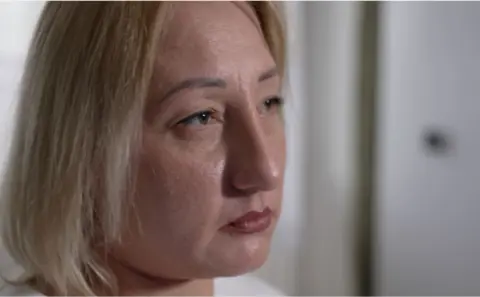Svitlana says she never considered betraying her country, “not for a second.”
“My husband would’ve never forgiven me,” she says, as we meet in her flat near Kyiv.
The 42-year-old had been waiting for news of her husband Dima, an army medic captured by Russia, for more than two years when she suddenly received a phone call.
The voice at the end of the phone told her that if she committed treason against Ukraine, Dima could be eligible for better treatment in prison, or even early release.
“A Ukrainian number called me. I picked up, and the man introduced himself as Dmitry,” Svitlana explains. “He spoke in a Russian accent.”
“He said, ‘You can either burn down a military enlistment office, set fire to a military vehicle or sabotage a Ukrainian Railways electrical box.'”
There was one other option: to reveal the locations of nearby air defence units — vital military assets that keep Ukraine’s skies safe from Russian drones and missiles.
As Dmitry set out his proposal, Svitlana says she recalled instructions that the Ukrainian authorities had distributed to all families in the event of being approached by Russian agents: buy as much time as possible, record and photograph everything, and report it.
Svitlana did report it, and took screenshots of the messages, which she showed to the BBC.
The Ukrainian Security Service, the SBU, told her to stall the Russians while they investigated. So she pretended to agree to firebomb a local railway line.
As we sit in her immaculate sitting room, with air raid sirens periodically wailing outside, she plays me recordings she made on her phone of two of the voice calls with Dmitry, made via the Telegram app. During the call, he gives instructions on how to make and plant a Molotov cocktail.
“Pour in a litre of lighting fluid and add a bit of petrol,” Dmitry explains. “Go to some sort of railway junction. Make sure there are no security cameras. Wear a hat – just in case.”
He also gave Svitlana a tutorial in how to put her phone on airplane mode once she was 1-2km away from her intended target, to avoid her signal being picked up by mobile phone masts that could be used by investigators.
“Do you know what a relay box is? Take a photo of it. This should be the target for her arson attack,” explained Dmitry, who demanded proof of completion of the task.
“Write today’s date on a piece of paper and take a photo with this piece of paper.”
In return, Dmitry said he could arrange a phone call with her husband, or for a parcel to be delivered to him.
Later, the SBU told Svitlana that the man she’d been talking to was indeed in Russia, and she should break off contact. Svitlana told Dmitry she’d changed her mind.
“That’s when the threats began,” says Svitlana, “He said they’d kill my husband, and I’d never see him again.
For days, he kept calling, saying: “Your husband is being tortured, and it’s your fault!”
“How concerned were you that he might go through with the threats to harm Dima?” I ask Svitlana. Her eyes moisten. “My heart ached, and I could only pray: ‘God, please don’t let that happen.'”
“One part of me said ‘this person has no connection with the prisoners.’ The other part asks: ‘What if he really can do it? How would I live with myself?'”











No comments yet. Be the first to comment!